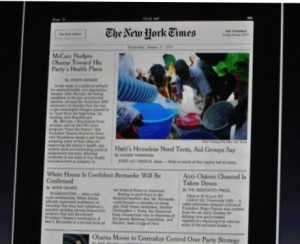I think this NYT Article (Who’s Driving Twitter’s Popularity? Not Teens.) misses the mark drastically and sows trite generalisms.
“Twitter’s unparalleled explosion in popularity has been driven by a decidedly older group. That success has shattered a widely held belief that young people lead the way to popularizing innovations.”
Who decided they were older? (Oh, for one and Industry Analyst – Never trust an Industry Analyst, they study the past.) I’d say the popularity has been driven by the age group that came of age with computers and the Internet. Who widely holds this belief? Has this belief really been shattered? For a short article with a lot of mouth and not a lot of money (i.e. column inches), Claire Cain Miller.
The only thing “youth tech” about Twitter is it’s cost. Free is in their ballpark. So it’s obviously other forces that have kept them from overwhelming it. I think you could actually do quite a bit of sociological work on the exact factors, but I’ll take a swing at some possibilities and let the academics start there and prove me wrong (or partially right).
First, younger children are protected by their parents from Internet Boogey Men. Some children are directed, others scared into submission, some over-the-shoulder chaperoned. Twitter began and evolved in a very raw form. Not one that in any way was child friendly. And little flash (other than the cute name and bird) or content (other than initially adult techies, and later adult celebrities – Aston Kutcher aside) to attract them.
I think the main reasons are ones of psychology and sociology. (And Miller covers these toward the end of her article.) Even though Twitter accounts can be locked up, the service works best in the open. Children spend most of their waking hours experiencing life directly with their friend network. Jim and Jane were both in Miss Johnson’s English class when she tripped and fell, they don’t need to tweet about it, they’re going to laugh about it together. And the hormone riddled youth are more about sharing secrets and are still learning social skills by doing that, and usually poorly.
When we’re five, the world goes all the way to the end of the block. When we’re teenagers it goes several miles past the high school. As we age or knowledge and interest expand but most often into thinner and thinner specialties. To share common honed interests our connection tentacle out across the state, nation, and world. It takes a certain amount of raw years to get to that point.
—
So, typical of most newspaper articles, the first two paragraphs made me think Miller was a mindless bozo who totally missed the mark, and the remainder of the article settled down, was interesting, and avoided it’s overstated initial assertions. I’m not sure if today’s editors do this, or if it’s self editing/censoring by writers.
